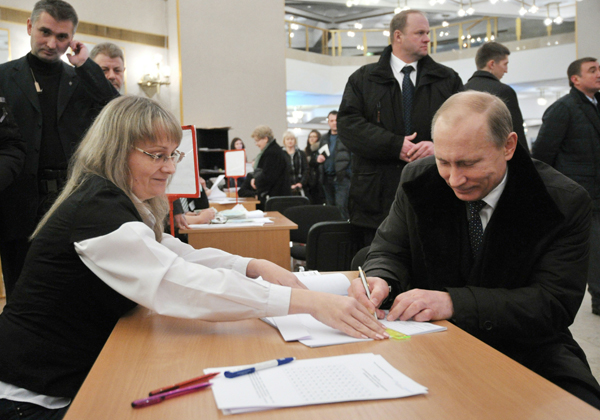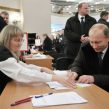
Questions About Putin’s Intentions Loom After the Duma Elections
Publication: Eurasia Daily Monitor Volume: 8 Issue: 220
By:

Expectations about the State Duma elections on December 4, were a record low, but all the political actors have reasons to claim success. The Kremlin-controlled United Russia is set to collect more than 50 percent of the vote, loudly declaring that its course of stability is supported by the solid majority of Russians. The communists will take a few more seats than they had and would trumpet a major victory for their “principled” opposition platform. Two smaller parliamentary parties led by Vladimir Zhirinovsky and Sergei Mironov will probably retain their positions of minimal significance and rejoice in their good fortunes. The timidly liberal Yabloko might gain a seat or two, and in any case would celebrate its continuing existence. Even the disjointed groups among the irreconcilable opposition would cheer the impact of their campaign against United Russia, which may drop by 10 percent to 12 percent compared to its overwhelming support in 2007 (Kommersant, Moskovskiy Novosti, December 2; BestToday, November 30). This broad satisfaction stands in contrast to the plain fact that the elections were a shameless sham organized to manufacture fresh legitimacy for the patently non-democratic regime.
The surge of quasi-political activity will continue until the presidential elections in March 2012, but it can only increase the irritation against the irreplaceable ruling elite, as pointed out by Mikhail Khodorkovsky, the most famous political prisoner in Russia (www.gazeta.ru, December 2). Instead of consolidating public support, the ruling bureaucracy aggravates the crisis of its own monopoly on power, but Vladimir Putin, the master of this self-reproducing kleptocracy, remains in denial of its degeneration (Novaya Gazeta, December 4). He expects few problems with executing the plan for taking another presidential term, but that would leave him with several questions that have cast deepening shadows over the Russian political landscape.
The first issue is why he ignores so brazenly the economic storm that is raging over Europe and is certain to hit Russia, which is tightly linked with the EU financial and energy markets. At the start of this developing disaster in 2008-2009, Putin relied on advice from his trusted treasurer Alexei Kudrin, who has given his final warning about the risks ahead and accepted being fired with a smile (Vedomosti, November 30). Now Putin is issuing commitments for raising salaries and pensions and defense expenditures, as if delivering on them would not be his concern and disregards such clear symptoms of troubles as capital flight, which has sharply accelerated in the fall and is estimated at an astounding $80 billion for the year (RBC Daily, December 1). The ambitious aim of “modernization” is quietly abandoned, because investments are not coming into the high-tech clusters, but the introduction of this discourse by the outgoing President Dmitry Medvedev has brought a better understanding of the stagnation caused by the over-development of the oil-and-gas sector – and a clearer view of the deepening dependency upon petro-revenues.
The fiasco of the “modernization” course frames the second question for Putin: when will the moment be right to dump Medvedev? On many joint campaign appearances, the two co-rulers take pains to perform as equal partners, but such pretense is denigrating for Putin, who has to restore the supremacy of his leadership (The Moscow Times, November 23). He also remembers that several times in the last couple of years Medvedev overruled his opinions, and such humiliations are never forgiven. Medvedev did play a useful role in encouraging the moderate reformers at home and in rehabilitating Russia’s relations with the West – damaged by the war with Georgia (Vedomosti, November 28). The meek decision not to seek a second presidential term has proven his loyalty but destroyed any credibility, so Putin needs to remove this political liability.
One instrument that Medvedev has sought to utilize for adding a modern façade to the Byzantine system of power is the Internet, and the results of these efforts are dismal. The fast-expanding Russian blogosphere has made a strong impact on the elections, repeatedly putting the authorities on the defensive and breaking the news that the official TV was instructed to ignore (Novaya Gazeta, November 25). The bloggers are making great fun of the pomp of the United Russia campaign and the twitters have awarded Medvedev the hash-tag “pathetic” (zhalky). Putin has very little understanding of the dimensions of this virtual political reality, so the counter-measures are limited to hacker attacks on the sites of Ekho Moskvy and The New Times on election day (www.newsru.com, December 4). Sultanistic regimes are incompatible with a free media, so Putin has to face the question: how to control the Internet?
One more question that has acquired threatening proportions this year, but was ignored in the electoral debates is: what to do with the North Caucasus? Putin’s method of calming the instability in trouble spots like Dagestan by pouring in money is not sustainable due to the angry nationalist backlash under the slogan “No more food for the Caucasus” (Russiy Zhurnal, December 3). Not a single terrorist attack has interrupted the campaign in Moscow or in any republic of the North Caucasus, but there is hardly much doubt that the undefeated rebels will strike again. One unexpected setback for Moscow occurred in the quasi-independent South Ossetia, where the defiant Alla Dzhioyeva defeated the Kremlin-backed candidate in the presidential elections – and refuses to accept the annulment verdict by the Supreme Court (www.lenta.ru, December 4). Putin’s pet-project of hosting the 2014 Winter Olympic Games in Sochi is certain to become a major destabilization factor in the region.
The number of looming questions is certainly longer than this shortlist of why, when, how and what; but Putin cannot expect that his new presidency would begin to work if he does not start to supply answers. Currents of events are leaving him behind with only wishful thinking about “stability” and occasional bursts of “manual management” amounting to little more than re-distributing money flows. Turning now to the favorite pastime of reshuffling his courtiers, Putin refuses to admit that his return to the Kremlin through the crudely manipulated elections not only cuts Medvedev to a fake premier but also reduces his own leadership to damaged political goods. His vision for an easy-going zastoi is heading for a hard and fast landing.




